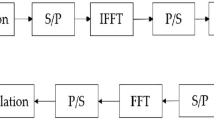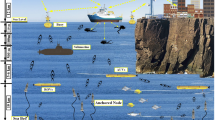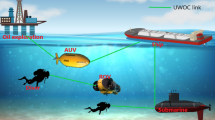Abstract
Due to the characteristics of the underwater acoustic channel especially the limited bandwidth, orthogonal frequency division multiplexing (OFDM) is widely used because of its high spectrum efficiency and ability in anti-multipath fading. However OFDM also has its drawbacks, one of which is the relatively high peak-to-average ratio (PAPR). The problem leads to saturation in the power amplifier and consequently distorts the signal which is not allowed in the underwater acoustic communication. Clipping as the most classic and convenience way is widely applied to address the high PAPR. However, it introduces additional noise that degrades the system performance. In this paper compressed sensing (CS) technique is proposed to mitigate the clipping noise. The scheme exploited pilot tones and data tones instead of reserved tones, which is different from the previous works and causes less loss of data rate. Also, in contrast with previous works, to minimizing the influence of underwater acoustic channel, compressed sensing in channel estimating is also adopted during mitigating the clipping noise, which can provide more accurate channel characteristics for estimating the clipping noise than traditional method such as LS or MMSE. The iterative CS technology proposed in this article can significantly improve the communication quality even in low SNR.















Similar content being viewed by others
References
Mueller, S. H., & Huber, J. B. (1997). OFDM with reduced peak-to-average power ratio by optimum combination of partial transmit sequences. Electronics Letters, 33(5), 368–369.
Baeuml, R. W., Fischer, R. F. H., & Huber, J. B. (1996). Reducing the peak-to-average power ratio of multicarrier modulation by selected mapping. Electronics Letters, 32(22), 2056–2057.
Lim, D. W., Heo, S. J., & No, J. S. (2009). An overview of peak-to-average power ratio reduction schemes for OFDM signals. Journal of Communications and Networks, 11(3), 229–239.
Wunder, G., Fischer, R. F. H., Boche, H., Litsyn, S., & No, J.-S. (2013). The PAPR problem in OFDM transmission: New directions for a long-lasting problem. IEEE Signal Processing Magazine, 30(6), 130–144.
Ochiai, H., & Imai, H. (2002). Performance analysis of deliberately clipped OFDM signals. IEEE Transactions on Communications, 50(1), 89–101.
Wang, L., & Tellambura, C. (2008). Analysis of clipping noise and tone-reservation algorithms for peak reduction in OFDM systems. IEEE Transactions on Vehicular Technology, 57(3), 1675–1694.
Saeedi, H., Sharif, M., & Marvasti, F. (2002). Clipping noise cancellation in OFDM systems using oversampled signal reconstruction. IEEE Communications Letters, 6(2), 73–75.
Liu, B., Liu, S., Rui, Y., Gui, L., & Wang, Y. G. (2014). A low-complexity compressive sensing algorithm for PAPR reduction. Wireless Personal Communications, 78(1), 283–295.
Donoho, D. L. (2006). Compressed sensing. IEEE Transactions on Information Theory, 52(4), 1289–1306.
Candes, E. J., Romberg, J. K., & Tao, T. (2006). Stable signal recovery from incomplete and inaccurate measurements. Communications on Pure and Applied Mathematics, 59(8), 1207–1223.
Wright, S. J., Nowak, R. D., & Figueiredo, M. A. T. (2009). Sparse reconstruction by separable approximation. IEEE Transactions on Signal Processing, 57(7), 2479–2493.
Kumar, P., & Kumar, P. (2015). A comparative study of spread OFDM with transmit diversity for underwater acoustic communications. Wireless Personal Communications, 83(1), 69–86.
Berger, C. R., Zhou, S., Preisig, J. C., & Willett, P. (2010). Sparse channel estimation for multicarrier underwater acoustic communication: From subspace methods to compressed sensing. IEEE Transactions on Signal Processing, 58(3 PART 2), 1708–1721.
Taubock, G., Hlawatsch, F., Eiwen, D., & Rauhut, H. (2010). Compressive estimation of doubly selective channels in multicarrier systems: Leakage effects and sparsity-enhancing processing. IEEE Journal on Selected Topics in Signal Processing, 4(2), 255–271.
Wu, J., Qiao, G., & Qi, X. (2016). The research on improved companding transformation for reducing PAPR in underwater acoustic OFDM communication system. Discrete Dynamics in Nature and Society, 2016(6), 1–9.
Niu, M., Salari, S., Chan, F., & Rajan, S. (2015). Recovery probability analysis for sparse signals via omp. IEEE Transactions on Aerospace and Electronic Systems, 51(4), 3475–3479.
Candès, E. J. (2008). The restricted isometry property and its application for compressed sensing. Comptes Rendus Mathematique, 346(9–10), 589–592.
Candès, E. J., Romberg, J., & Tao, T. (2006). Exact signal reconstruction from highly incomplete frequency information. IEEE Transactions on Information Theory, 52(2), 489–509.
Acknowledgements
The authors thank the project of the National Natural Science Foundation of China Nos. 61431004, 6140114 and 11274079 and the Fundamental Research Funds in Heilongjiang Provincial University No. 135209239. The authors also thank the Technical Bureau of Qiqihar GYGG-201622.
Author information
Authors and Affiliations
Corresponding author
Additional information
Publisher's Note
Springer Nature remains neutral with regard to jurisdictional claims in published maps and institutional affiliations.
Rights and permissions
About this article
Cite this article
Wu, J. Iterative Compressive Sensing for the Cancellation of Clipping Noise in Underwater Acoustic OFDM System. Wireless Pers Commun 103, 2093–2107 (2018). https://doi.org/10.1007/s11277-018-5897-9
Published:
Issue Date:
DOI: https://doi.org/10.1007/s11277-018-5897-9




